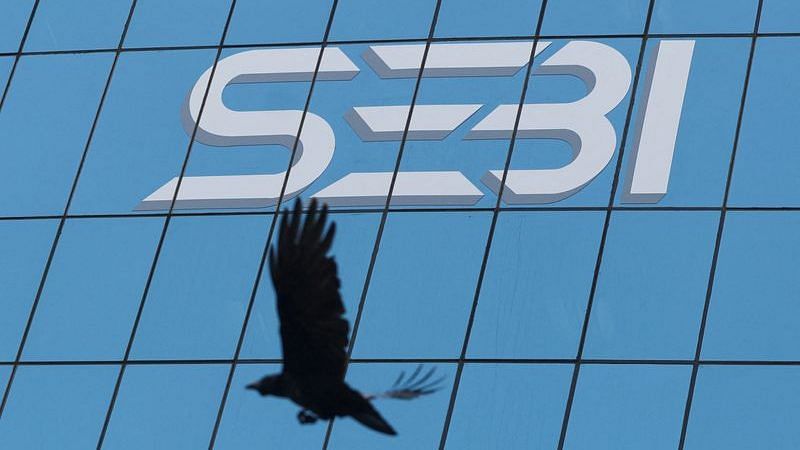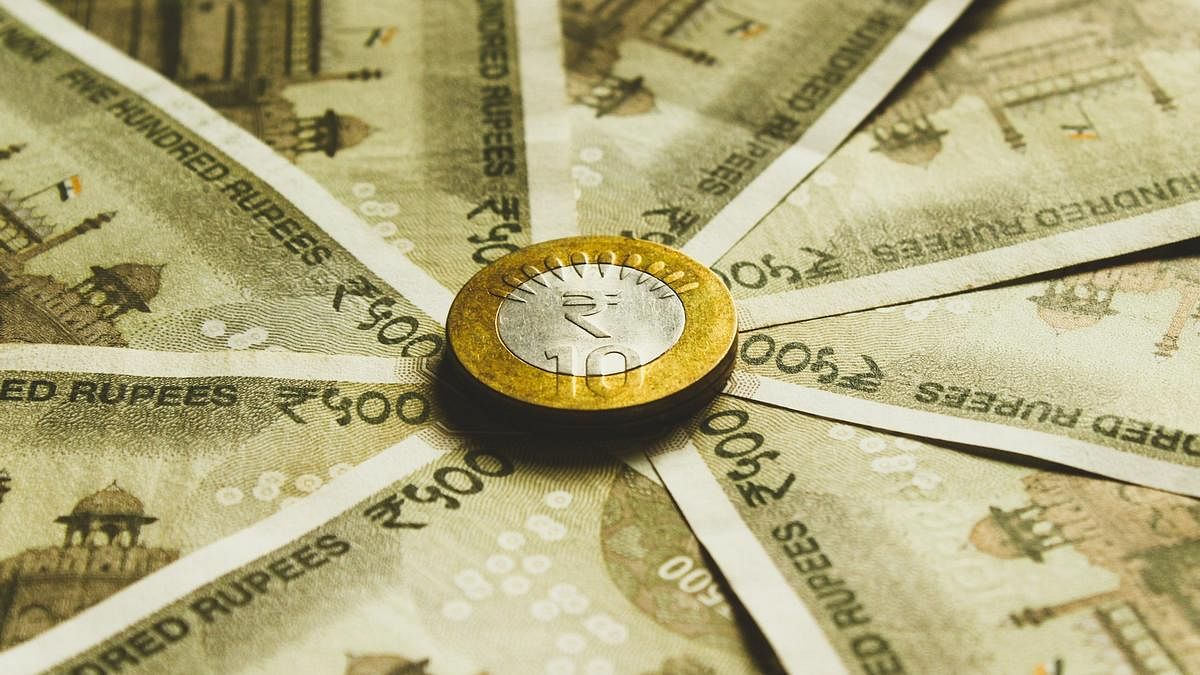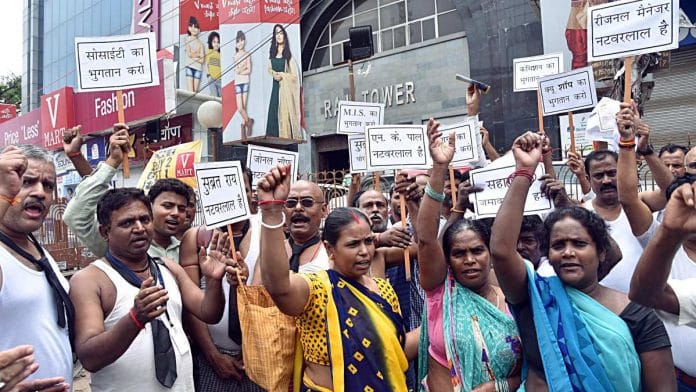New Delhi: The death of Subrata Roy on 14 November may have reignited fears among the small investors in the Sahara Group’s cooperative societies that they will never see their money again, but it’s only another twist in a rollercoaster of emotions — hope, despair, frustration and anger — they’ve had to face over the last few months.
These cooperatives — Sahara Credit Cooperative Society Limited, Saharayn Universal Multipurpose Society Limited, Humara India Credit Cooperative Society Limited, and Stars Multipurpose Cooperative Society Limited — were launched between March 2010 and January 2014, in Lucknow, Bhopal, Hyderabad, and Kolkata.
Crores of investors, under the promise of massive returns, chipped in money. They got some money in the initial years, but nothing since 2017-18, according to a report in The Hindu.
What happened, and whether it was fraud on the part of the Sahara Group and its chairman Subrata Roy, is being investigated by multiple agencies.
The group has been under probe by the Enforcement Directorate (ED) since 2008.
In 2012, with money-laundering allegations added to the mix, the Supreme Court — upholding a Securities and Exchange Board of India (SEBI) order — directed Sahara to deposit Rs 25,000 crore in a ‘Sahara-SEBI Refund Account’ so that high net-worth investors of two other companies — Sahara India Real Estate Corporation Limited (SIRECL), and Sahara Housing India Corporation Limited (SHICL) — could get their money back.
The apex court ordered an aggregate amount of Rs 25,781.37 crore with SEBI, within a period of three months from the date of the order.
Fast-forward to 2023, nearly none of the big investors has come forward to claim their money.
SEBI’s 2022-23 annual report shows that it has refunded Rs 138.07 crore to 48,326 accounts in response to 17,526 applications by the investors of the two Sahara Group firms.

According to the SEBI report, the remaining applications were closed either due to their records not being traceable in the documents/data provided by SIRECL and SHCIL, or on account of no response received from the bondholders on the queries raised by SEBI.
ThePrint has contacted SEBI for comment by email and this report will be updated when a response is received.
In response to a petition by the Government of India, the Supreme Court in March 2023 ordered that Rs 5,000 crore of this corpus be transferred out of the Sahara-SEBI Refund Account and moved to the Central Registrar of Cooperative Societies (CRCS) so that it can be distributed to the small depositors in the Sahara Group of cooperative societies.
On 18 July, the Modi government set up the CRCS portal for investors in the four cooperatives, bringing with it hope that there was restitution in sight for those who lost their money.
In the wake of Roy’s death, SEBI Chairperson Madhabi Puri Buch sought to assuage concerns about its possible impact on the investigation.
The Sahara matter, she said, was about an entity’s conduct. “It will continue regardless of whether an individual is there or not,” she added.
In August, Union Minister of Cooperation Amit Shah said the Modi government was determined to return the investors’ money.
Even so, the hopes of investors seem to be fading — simple paperwork is believed to be stymying the refund applications of lakhs of depositors and, frustrated, they now plan to protest en masse in Delhi next month.
ThePrint has contacted the Ministry of Cooperation over phone and email for a comment on the matter, and this report will be updated when a response is received.
Also Read: Sahara matter will continue even after Roy’s death: Sebi chief
Rejected claims, fading hopes
Shankar Pandit, a 40-something resident of Shubhankarpur village of Muzaffarpur, Bihar, was a Sahara agent.
Along with hundreds of neighbours he brought on board, Pandit himself made an investment of Rs 4 lakh in the cooperative societies. For the others, the investments ranged from a few thousand rupees to multiple lakhs.
Most of the depositors from Pandit’s village applied for refund on the CRCS portal, but despite the fixed limit of 45 days for a refund, a large number of people are yet to get their money back.
“The application is being rejected on frivolous grounds like, the name doesn’t match with Sahara’s database, and the name written on the bond is not matching the name written on the Aadhaar card,” Shankar said. “Data should be sought from Sahara but it is being sought from the depositors.”
According to agents, depositor details during the investment process were collected in a haphazard manner, many times without verifying the names with IDs.
Further, Aadhaar was only rolled out in 2010 — with gradual enrolment — there are discrepancies with respect to that information as well.
Unaware people & an irresistible lure
Experts believe that the lure of Sahara’s products was a simple one: the promise of hugely attractive returns made by familiar people.
“Sahara made agents in every village who were people’s acquaintances or relatives and were trusted,” Aviral Pandey, assistant professor at Patna’s A.N. Sinha Institute of Social Studies said. “Sahara used people’s network and emotions to target the investors.”
Most of those who invested money in Sahara were small investors who wanted to invest their savings somewhere instead of keeping them at home.

“At the time, small investors did not know much about opportunities like the share market and Sahara gave them the dream of making more money with less money in less time and people kept getting trapped in it,” Pandey said.
Rajesh Kumar Gautam, professor of anthropology at Dr Harisingh Gour University in Sagar district of Madhya Pradesh, said Sahara’s smart marketing strategy trapped people.
“In Madhya Pradesh, too, a large number of people have their money stuck,” Gautam added. “People invested a lot in the Sahara in the hope of increasing their wealth in a short period of time.”
“People had never been cheated on this level, so they trusted and invested the money, but Sahara’s phishing tactics drained people’s years of savings,” he said.
Social pressure, financial stress
Since 2019, Pandit said, he has been trying to get the money back and he wrote letters to the Prime Minister’s Office (PMO), the Reserve Bank of India (RBI), Central Registrar of Cooperative Societies, and Ministry of Cooperation, but has received no response.
In the meantime, he added, he faces considerable social pressure. It was on his word that his neighbours invested their money, after all.
“People of the village stop me on the way at any time and start asking for money,” he said. “I feel ashamed to even leave the house. Respect has been completely destroyed and whatever savings were there are also on the verge of depleting.”
It’s a similar story across the country.
Like Pandit and hundreds of people from his village, the money of more than 10 crore investors across the country is stuck.
Sahara agent Ramashankar Maurya in Hardaspur village of Sultanpur district, Uttar Pradesh, said about 100 people in his village had invested money in Sahara.
“After hearing the news in July, people started applying on the CRCS portal through common service centres, but only a few people got their money back,” he said.
Common service centres (CSCs), of which there are around 5.5 lakh in India, are access points for the delivery of government-to-citizen e-services.
Reena Kumari, a resident of Saharsa, Bihar, started investing money in Sahara in 2009. She said she had a sum of Rs 1 lakh stuck in Sahara.
She had hoped while investing that after a few years she would have a sufficient sum to pay for her daughter’s wedding. Now, she said, her savings are on the verge of being wiped out.
“I used to save a little money and invest it in Sahara, but now everyone knows the situation,” Kumari said.
When Kumari came to know about the refund opportunity through the newspaper, she claimed the money in August through CSCs but, she said, her application was rejected due to the absence of her name in the database.
“After the application, there was hope that the money would be returned but now that too has been dashed,” she said.
Rajeev Kumar, who runs a common service centre in Saharsa, said, as soon as people came to know about the portal, they started coming to file their applications.
“But after 45 days, only a few people could get the claim and the applications of many people were rejected,” he added.
There are an estimated 1.5 crore Sahara investors in Madhya Pradesh, 85 lakh in Uttar Pradesh, 55 lakh in Bihar, 24 lakh in Jharkhand, 18 lakh in Rajasthan, 20 lakh in Odisha, 14 lakh in Bengal, and 6 lakh in Gujarat. Most of them belong to rural and semi-urban areas.
To fight the battle on behalf of Sahara depositors, the United All India People’s Movement Sangharsh Nyay Morcha was established in Uttar Pradesh in 2018.
Organisation president Abhay Dev Shukla said Subrata Roy established a big empire by taking money from small investors.
“People were cheated so much by promising to improve their lives. Many people are under mental stress,” he said.
Shukla claimed that more than 4,000 investors and agents had killed themselves so far over the losses they faced due to Sahara. “After the death of Subrata Roy, five investors committed suicide,” he added.
Last year, the Modi government was asked in the Lok Sabha to state “the number of people who have committed suicide due to non-payment by the Sahara India Group so far”. In response, the finance ministry said no data was available on the “impact of individual investors due to non-payment” by SIRECL and SHICL.
Also Read: Undistributed funds worth over Rs 25,000 cr with Sebi in focus after death of Subrata Roy
Government takes note
On its part, the government has taken note of complaints about the claims process.
The CRCS portal says that the government has communicated to depositors whose claims were rejected on account of discrepancies that there was an issue.
Further, a CRCS-Sahara Refund Portal for resubmission has been launched so depositors can rectify the discrepancies and resubmit their claims.
The portal has been opened in a phased manner — from 15 November to 25 November for claims up to Rs 10,000, and 25 November onwards for claims up to Rs 19,999. The date for the third phase, for all claims, “would be communicated soon”, the portal says.
While the initiative is welcome, the phased rollout is leading to fewer people coming forward to claim their refunds, according to Abhay Dev Shukla.
“A large number of people are not happy with this policy, so investors are not even making claims,” Shukla told ThePrint. “Investors want the entire money, not in instalments.”
Shukla and his organization have decided that more than 5 lakh investors will gather in Delhi on 27 December and protest.
“After creating pressure, the government has decided to disburse Rs 5,000 crore,” he said. “Now we will reach Delhi’s Jantar Mantar and will protest at the BJP office and the PMO and demand the return of money.”
(Edited by Sunanda Ranjan)






